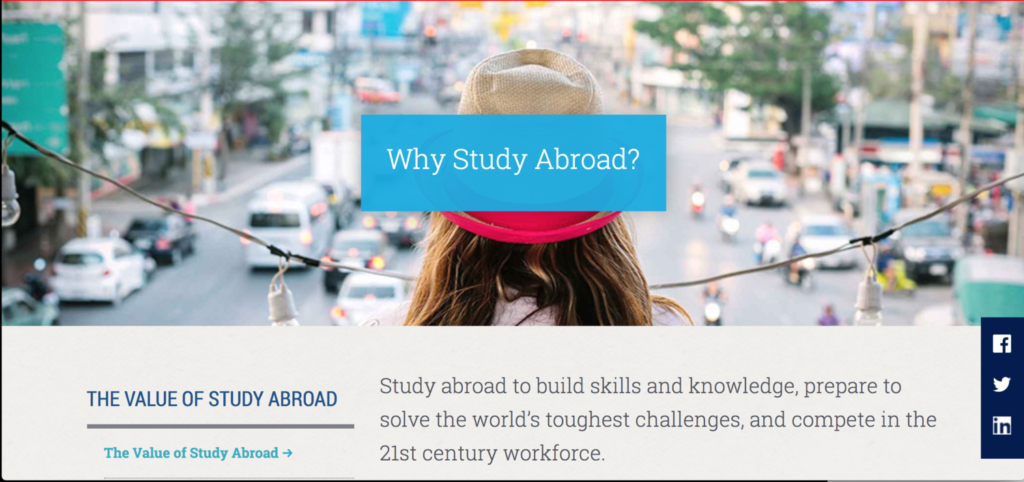Last Spring, I started a series on ideologies of study abroad (my current research project!)and you can read previous posts on study abroad as tourism, language immersion, and personal transformation. In this post, I’ll be tackling another common ideology, that of study abroad as professional preparation. Under this ideology, study abroad results in specific skills that translate to advantages in the modern workplace. Examples of this ideology are common in promotional materials for study abroad, such as the image below taken from the U.S. Department of State’s study abroad website (note also the highgrounded and foregrounded students, as in images for the ideology of personal transformation).

Another example can be found on the IES website, which provides an infographic connecting study abroad to increased opportunities after graduation.

While gaining professional skills is important, particularly in our current state of economic insecurity and anxiety, it’s also crucial to understand how this focus on study abroad as professional preparation reinforces inequitable social structures. Neoliberalism, our current economic state, focuses on the commodification of individuals and their particular skill sets. Study abroad thus becomes a way to increase one’s individual value, based on skills expected to result from this experience. Yet, as any outcomes research on study abroad research shows, the development of skills such as language proficiency and intercultural learning varies widely, both across and within study abroad programs. Assuming a certain skill set based on study abroad is not only inaccurate, but discounts other ways in which similar skills may be developed at home (e.g. living in a minoritized community). Given the differential access to study abroad based on factors like race and class, overemphasizing study abroad for professional preparation can reproduce, rather than contest, these inequitable structures. For example, do the IES alumni from the graphic above earn more money because they studied abroad? Or because they belong to a social class that earns more (and also makes it easier for them to study abroad?)
In a related process, as more and more students study abroad, students need to seek value distinctions within study abroad to distinguish themselves in the neoliberal marketplace. This leads to an emphasis on certain types of destinations (usually non-European ones for U.S. students) as more valuable (due to the opportunity to study “critical” languages, or deal with cultural differences perceived as greater). It can also lead to a valuing of particular types of experiences (homestays, language pledges, avoiding other study abroad students) as more “authentic.” The creation of these types of value distinctions helps reinforce, rather than contest, our pre-existing perceptions of cultural difference, first by assuming there is some sort of static, “authentic” experience students can access, and secondly by either minimizing cultural differences (in the case of European countries assumed to be similar) or cultural similarities (in the case of non-European countries assumed to be wildly different).
To be clear, I am not critiquing study abroad students for using study abroad to pursue social mobility, or to distinguish themselves on the neoliberal job market–it is a rough one. However, I do think we need to pay attention to the ways in which our desire to prepare for this market by studying abroad leads to the creation of an ideology of professional preparation that only tells part of the story. We should also be aware of the ways in which this ideology (and the other ideologies of study abroad) uphold inequitable social structures–if we’d like to dismantle these structures (and I hope we all do!), we have to reimagine our ideologies of study abroad in ways that actually contest them, rather than reproduce them.

Leave a Reply